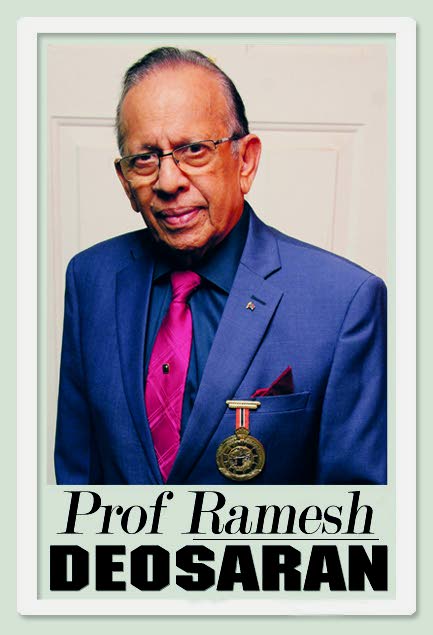The pathology of power

In the current rough and tumble of American politics, billionaire businessman and former president Donald Trump, seeking a second term, boldly declared that if he wins he will be executing “revenge and retribution” against those who opposed or criticised him.
Of course, he is being honest. Then to his Ohio crowd, he complained: “Immigrants are poisoning our country.”
As a grandstanding power-seeker, he is prepared to exploit the fears, prejudices and perceived deprivations of large parts of middle and eastern America. He seems to genuinely believe that he was cheated out of winning the 2020 elections.
And with President Joe Biden’s shaky popularity, Trump, from his roving platform, continues to exaggerate, rebuke and threaten critics, claim dubious achievements, make rosy promises and skilfully parade himself as the “saviour of America.” That is the way of a narcissistic power-seeker.
And he knows a lot of crowds believe him. (In the 2020 elections. Biden got 51 per cent, 306 electoral votes and over 81 million voters; Trump got 47 per cent, 232 electorate votes and over 74 million voters.)
Would these numerous election and financial court cases against Trump attract more or less sympathy voters? This subject of the power-seeker is very important, especially for a democratic society which provides large spaces for political exploitation and abuse. Furthermore, as a warning, no matter what political system we have, it can be turned, twisted or disabled by the power-seeker in charge.
Ordinary politicians perform some of these mind-bending techniques too. But the narcissistic type, self-absorbed and power-obsessed, is essentially a lone ranger, tactfully using others for his or her own selfish objectives. Only power could cool their restlessness.
As Yale University's Prof Harold Lasswell explains, the greed for more and more power creates a pathological personality. Weird, hubristic, bipolar behaviours emerge. These would spy, harass, spite, imprison even kill their critics. Some disguise themselves as “benevolent dictators,” using the police or army for their evil deeds.
We had Adolf Hitler, Joseph Stalin, Benito Mussolini, Idi Amin, Saddam Hosein, Robert Mugabe, Pol Pot, etc. The Caribbean had a few large notables like Grenada's Eric Gairy with the "Mongoose Gang” and Haiti's Francois “Papa Doc” Duvalier with the “Tonton Macoute.” With their passing, they usually leave their respective countries in a miserable condition.
Much of the extensive social suffering and political damage done by such power-obsessed characters are sometimes discovered after their departure. Many of their close advisers and supporters then deny the relationship. Tragically, many a ruthless power-seeker dies without being fulfilled, miserable in exile or suffering alone.
Citing several examples, clinical neurologist and former British foreign secretary Lord David Owen, wrote an authoritative book on this rarely-researched but important subject – In Sickness and in Power (2008). He stated: “Something happens to some leaders’ mental ability while in power. Hubris behaviour with excessive self-confidence is almost an occupational hazard for heads of government. It feeds on isolation and excessive deference.”
Former deputy prime minister Dr Patrick Solomon gave us a glimpse of Dr Eric Williams’ political character. In his 1981 autobiography, he wrote: “Dr Williams’ crude efforts to put me in cold storage was a method that was very popular with him and which broke many a civil servant…It irked me to see opportunities go begging because of petty spite.” Former health minister Dr Winston Mahabir, in his own biography (1978), made similar references to Dr Williams. My UWI colleague Prof Selwyn Ryan pointed to Dr Williams’ “bipolarity.” Was he really a ruthless power-seeker? Or is such treatment common to all our political leaders here?
One of the reputable scholars on this subject, Lasswell, in his book, Power and Personality (1976), said: “The power-seeker pursues power as a means of compensation against deprivation.”
For several reasons, his greed for power is to compensate for his feelings of being deprived of the fame or prestige he “deserves.” Once on this psychological track, his quest becomes relentless, even with disguised ruthlessness. This political type, says Lasswell, is characterised by an intense and ungratifying craving for deference from others.
Of course, the energetic power-seeker does not get there by himself. There are always enough simple-minded, insecure people around to follow and even adulate – a political resource well-known to him. Hitler recognised this. In his book, Mein Kampf, Hitler, ironically, stated: “The public, as stupid as it is forgetful, is, as a rule, prevented from recognising the real instigator of the struggle or else has forgotten him, and the scoundrel has to all intents and purposes achieved his goal.” The narcissistic power-seeker has no respect for the crowd, the masses. He has witnessed their gullibility and yearning for any kind of “messiah” to heal their own insecurities. And sometimes an entire society can become pathological.


Comments
"The pathology of power"